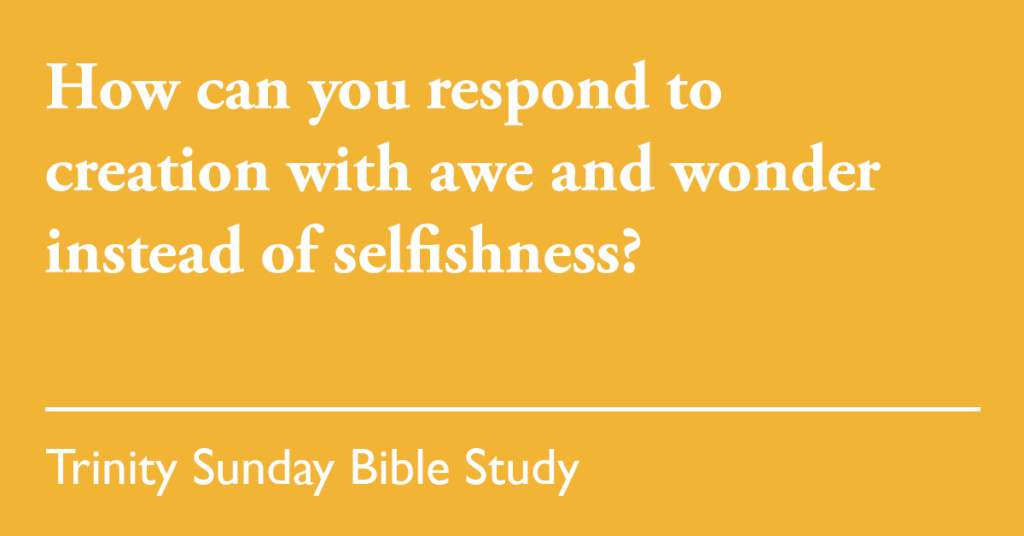Bible Study: Trinity Sunday (C) – June 12, 2022
June 12, 2022
[RCL] Proverbs 8:1-4, 22-31; Psalm 8 or Canticle 13 (or Canticle 2); Romans 5:1-5; John 16:12-15

Proverbs 8:1-4, 22-31
The book of Proverbs is a collection of traditional cultural lessons—propositional statements, observational sayings, analogies, and ethics—structured as the teachings of a father to a son. This kind of “instructional literature” is one of the ways a family nurtures how a child is socialized into a certain world. These proverbs were passed on in the oral tradition and are therefore used extremely contextually: they use references and assumptions housed in a particular time, place, and culture. This particular passage comes from the Proverbs of Solomon (David’s son, King of Israel.)
Wisdom is one of the major themes here. The Proverbs illustrate wisdom as an agent of Yahweh, present and active even in determining the shape of creation. Wisdom (anthropomorphized throughout Proverbs as a lady or goddess) was involved in the creation of the world, and so forms a bridge between the Creator and the created. This offers an alternative way to see the relationship between God and the universe— instead of blind obedience, here we have collaboration and co-creation. This kind of relationship teaches that by acquiring wisdom, human beings can also share in the wisdom of God and can flourish and receive a sense of purpose and meaning. As Walter Brueggemann says, “This is indeed literature for ‘grown-ups.’”
- What kind of sayings, analogies, and proverbs have socialized you in your context? Think about the aphorisms, nursery rhymes, songs, family tales, etc. that have influenced you.
- How does or can wisdom help grow your relationship with God?
Psalm 8
This psalm praises God’s majesty in awe and wonder. According to the poet of this psalm, just as the heavenly beings are given dominion in the heavenly world, earthly beings reign over the sky, earth, and sea. Despite our limitations, the Creator has given humanity great honor and responsibility. The psalm reminds us that everything we have is an unwarranted gift from a God of abundance. However, when we look at how humanity has received and then used, abused, and neglected the gift of creation, it is hard to hold our heads high to thank God for it. Have we risen to the responsibility God has given us to be a responsible part of the community of creation, or have we accepted the gift selfishly without looking at the repercussions of our actions? God gives out of abundance, and we are called to respond with awe and wonder— not selfishness and short-sightedness.
- How are you in relationship with the sky, earth, and sea?
- How can you respond to creation with awe and wonder instead of selfishness?
Romans 5:1-5
“Suffering produces endurance, and endurance produces character, and character produces hope, and hope does not disappoint”— I think I saw this on a classroom poster one time! Paul’s letter to the Romans attempts to make meaning from the suffering of Jesus’ followers. His death and suffering— and the early Church’s grief and oppression— is not in vain. Jesus having been crucified as a martyr in political execution puts the God of Israel no longer at the top of the pyramid of power. Instead, as Dewey writes, “This God has entered into solidarity with the nobodies of the empire. Such a vision of God upsets the first-century world of power and authority.” His suffering on the cross demonstrated the grace and love God has for us. That’s meaningful.
Becoming a follower of Christ does not mean we will never suffer. It means that we have an invitation to experience the newness of a life free from bondage to sin. What God has done since the beginning of time, including Jesus’ martyrdom, fulfills a hope that is with us now and in the future.
- In God’s economy, nothing is wasted, not even suffering. How can you make meaning out of your suffering? How can you make your pain purposeful?
John 16:12-15
A few years ago, I went through a really horrible situation. I kept thinking I had hit rock bottom, and then I would find that I could, in fact, fall even lower. If I had seen the whole story at once, all the trips and stumbles it would take for me to be whole again, I would probably have given up. Instead, I could only look at what was right in front of me— one day at a time.
Jesus knew that sometimes the whole story is too big, scary, and complex to tell at once. This passage from John comes from the account of the “last supper.” Jesus tells his friends that the truth he has told them so far is radically incomplete. As Martin Smith writes, “They are incapable of taking in any more until his death, resurrection, and ascension have opened up a totally new relationship with God.”
With the Spirit’s help, the truth of God’s love and Jesus’ resurrection will continually be revealed to the disciples and to us. As our lives continually change, we will continually be moved into deeper relationship with Christ. And we will hear what we need to hear, even if it’s not the whole story.
- How do you make space to listen to the Spirit in your life?
This Bible study was written by Anna Sutterisch for Trinity Sunday (C) in 2019.
¡No olvide suscribirse al podcast Sermons That Work para escuchar este sermón y más en su aplicación de podcasting favorita! Las grabaciones se publican el jueves antes de cada fecha litúrgica.


